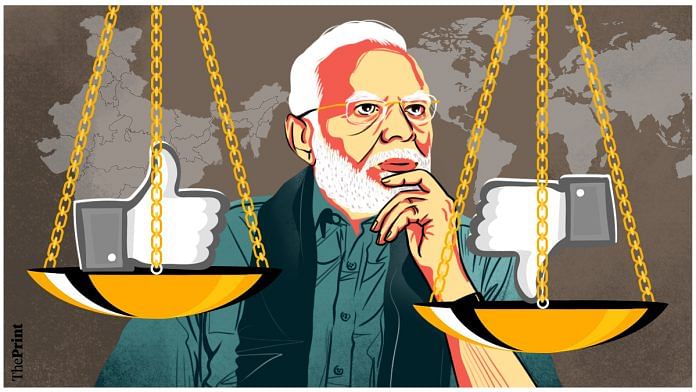Pew Research tells us that the people in a couple of dozen selected countries think well of India but less well than in the past, and that Narendra Modi scores only about half as well abroad as he does at home, where his popularity is almost off the charts.
Going further, about half of those surveyed by Pew feel India has not gained in power or influence in recent years, which is very much a minority view within the country. Some of the dichotomy between domestic and international opinion is to be expected, and some of the takedown implicit in the survey’s numbers is a deserved cold shower. But some of the findings would come as a surprise to even those who have not been persuaded by the Narendra Modi government’s relentless image-building.
It is impossible to argue, for instance, that India’s standing and profile are not on the rise when it has become the fifth-largest economy, that the moon landing hasn’t made an impression beyond the country’s borders, that Indian moves don’t impact the rest of the world both positively (vaccine supply) and negatively (rice export ban) much more than in the past, and that one of the world’s fastest-growing economies and the third-largest contributor to global growth will not count for more in the coming years.
Nor can one dispute the evident success of Indians overseas in multiple fields, with growing numbers and influence, and with a creditable record of integration into their adopted societies. All of this makes for a compelling story that reflects well on the mother country.
But the government’s permanent campaign mode and the impressive energy of its ministers create a noise level that can cloud the mind. After all, despite many hopeful pronouncements, India has little to show by way of free-trade agreements. Those who don’t read the business papers, and even many who do, may be surprised to be told that foreign direct investment inflows shrank last year and so far this year, and that foreign portfolio money saw a net outflow in 2022 before reversing direction in 2023.
As for Mr Modi, whose soaring domestic popularity has been confirmed by Pew’s survey, foreign governments have no choice but to deal with a strong prime minister who gives every impression of being around for some time to come.
But that does not mean informed citizens in other countries are unaware of the nature and direction of political developments in India, and that this won’t affect their views of the country.
Then there is China. Since power is a relative game, it matters that India’s rise has been overshadowed by China’s, to the extent that even India’s neighbours have stronger trade relations with China than with India, and also more defence dealings. There can be little doubt that Beijing was the primary mover behind the expansion of BRICS’s membership, and that it has pushed BRICS in the direction of becoming more of an anti-West platform; India has been forced to play along.
Also read: ‘Modi hatao’ vs ‘Amrit kaal’ — why Opposition will need more than criticism of govt to win in 2024
In bilateral ties too, Beijing shows no inclination to take the foot off the pedal, whether it is the buildup of civil and military infrastructure along the disputed border, cartographic aggression, or blocking India’s entry into key forums.
If Xi Jinping stays away from the G20 summit in New Delhi, with Vladimir Putin also absent, some of the shine will come off an event that Mr Modi has used to showcase India and, not least, to project himself. China’s larger game plan may well be to reduce the G20’s salience while promoting BRICS.
So, realistically speaking in the world as we have it, there are two superpowers, two or three great powers like Russia, and then the middle powers among which India has gained in prominence.
Handicapped without a UN Security Council veto, India can nevertheless become a great power if it continues to do well economically, develops a large manufacturing sector, gains in technological heft, builds a more capable defence industry, improves its human development indicators, becomes more of a trading nation, and has greater internal cohesion. In short, it is a work in progress.
By special arrangement with Business Standard.
Also read: Can a good acronym give currency to a group that’s lost relevance? The curious case of BRICS today



